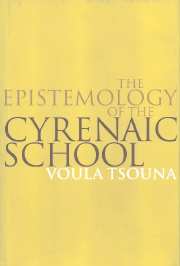Book contents
- Frontmatter
- Contents
- Preface
- Abbreviations
- 1 Knowledge and the good life: the ethical motivation of the Cyrenaic views on knowledge
- PART I SUBJECTIVISM
- PART II SCEPTICISM
- PART III SUBJECTIVISM, EMPIRICISM, RELATIVISM: CYRENAICS, EPICUREANS, PROTAGOREANS
- 9 Cyrenaic subjectivism and the Epicurean doctrine that all perceptions are true: Plutarch, Adv.Col. 1120f–1121e
- 10 Cyrenaic epistemology and Protagorean relativism: some considerations
- 11 The Socratic connection
- Appendix: Sources and testimonies
- References
- Index of names
- Index locorum
- Subject index
9 - Cyrenaic subjectivism and the Epicurean doctrine that all perceptions are true: Plutarch, Adv.Col. 1120f–1121e
Published online by Cambridge University Press: 22 September 2009
- Frontmatter
- Contents
- Preface
- Abbreviations
- 1 Knowledge and the good life: the ethical motivation of the Cyrenaic views on knowledge
- PART I SUBJECTIVISM
- PART II SCEPTICISM
- PART III SUBJECTIVISM, EMPIRICISM, RELATIVISM: CYRENAICS, EPICUREANS, PROTAGOREANS
- 9 Cyrenaic subjectivism and the Epicurean doctrine that all perceptions are true: Plutarch, Adv.Col. 1120f–1121e
- 10 Cyrenaic epistemology and Protagorean relativism: some considerations
- 11 The Socratic connection
- Appendix: Sources and testimonies
- References
- Index of names
- Index locorum
- Subject index
Summary
In the two subsequent chapters, I shall turn to the parallels drawn by ancient authors between the Cyrenaic position on the one hand, and the doctrines of Epicurus and of Protagoras in Plato's Theaetetus on the other hand. My aim is to show where the Cyrenaic position approaches certain varieties of empiricism and relativism, and also where it diverges from either of these positions. If this is achieved, we may reach a better understanding of the bounds and limitations of the Cyrenaic doctrine.
I shall start with Plutarch [T1], who raises the issue of the relation between Cyrenaic scepticism and Epicurean empiricism. Plutarch's testimony [T1] consists of two parts. In chapter 6 I discussed the first part of the testimony (1120c–f), in which Colotes comes out as an unreliable and even malicious historian, but as a good philosopher. This picture changes in the second part of Plutarch's passage (1120f–1121e), in which Colotes is accused of philosophical naivety on two accounts. First, Plutarch maintains that Colotes fails to see that he is attacking the very tenets which, as an Epicurean, he is bound to endorse.
It would seem that Colotes has the same trouble as boys who are just starting to learn how to read. While they are used to spelling the characters on their tablets, when they see these characters written on other things outside the tablets, they are doubtful and confused. And so with him: the views which he follows eagerly and treats with respect when they occur in the writings of Epicurus, he neither understands nor identifies when they are asserted by others. (1120f–1121a)
- Type
- Chapter
- Information
- The Epistemology of the Cyrenaic School , pp. 115 - 123Publisher: Cambridge University PressPrint publication year: 1998



